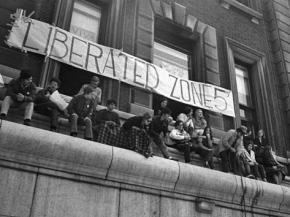Time to protect free speech at Columbia
reports from Columbia University in New York City on a town hall meeting to discuss the process to change rules of conduct on campus.
MORE THAN 300 students and faculty at Columbia University gathered October 17 at the first of several scheduled town hall meetings to voice their concerns regarding potential changes to the university's rules of conduct.
The university's Senate Rules Committee--an organization made up of students and faculty and tasked with creating the university's rules of conduct--hosted the town halls, which were scheduled in the wake of discussions surrounding potential changes to the rules of protest and free speech on campus.
These rules, put into effect following the building takeovers by Columbia students (most notably, Students for a Democratic Society) in 1968, haven't been altered since the late 1980s, when an anti-Zionist demonstration on campus led to the strengthening of the university's ability to prosecute activists.
Since then, other methods of prosecution have become much more prevalent, such as Dean's Discipline, under which no outside parties hears the cases and the accused have fewer rights.

Consequently, the formal hearing process allowing students to speak before people unaffiliated with the university hasn't been invoked since 1993, when activist Todd Chretien and others were tried for protesting the university's bulldozing of the Audubon Ballroom, where Malcolm X was assassinated in 1965. Chretien wrote:
Back in 1992, I and 400 students occupied Hamilton Hall. Four other students and I were suspended after a show trial under the codes of conduct. Columbia bulldozed what ought to be a national monument and cashed in on its investments...Let's get real. There is no free speech at Columbia, and there never has been.
WHILE THE committee has made no formal proposal to amend the rules, students who spoke at the town hall meeting showed unanimous support for rules that strengthened students' right to free speech. Student committee members Jared Odessky and Sejal Singh commented:
Our major concern is that the rules of university conduct are broadly written and could be applied to punish students, at many of the on-campus protests we have seen in the last four years at Columbia. Since the 1970s, only a handful of students have been formally disciplined for conduct related to free speech activity. But as the rules are currently written, we cannot say with confidence that this pattern will continue since responsibility for administering the rules can potentially shift between administrators or offices.
Other proposed changes to the rules, in addition to tightening language on what constitutes an offense, include adding less severe punishments to the possible consequences for infractions, guaranteed advocacy by Columbia faculty on the behalf of defendants, and increased protections of the rights of the accused in university proceedings. Students also advocated for greater transparency and student agency in the revision process, a demand drawing some resistance from the committee.
"We all know that we care about the redrafting of the rules and the issue of free speech," said Megan Wicks, a student activist and member of the International Socialist Organization (ISO) present at October 17 proceedings. "So it was laughable when, at the beginning, the panel asked if students really wanted to be part of the review/redrafting process. I think, with our presence and our voices, we showed that Columbia students are concerned and are paying attention."
While the student committee members seemed generally supportive of the campus activist community, there is still fear among students that this opportunity for change might bring about even more negative circumstances for free speech advocates at the university.
Early discussions in the town hall were dominated by student criticism of a potential shift to an internal discipline process, similar to Dean's Discipline. This drew a strong reaction from students who, having participated in activism criticizing the administration, feared a potential conflict of interest.
"You can't deny," one activist told the committee, "the obvious incentive the administration has to protect its own image by shutting down certain forms of student protest."
Students provided extensive descriptions of recent actions taken by the university to limit the effectiveness of student activism, including the ongoing nationwide push for justice for victims of sexual violence. "The university's...principles are not recognized in practice by the institution in which they operate," said ISO activist Dorian Bon. "The outcome of this year's protest guidelines review will primarily affect student groups who have longstanding reasons to challenge the university's policies."
Student activist groups came out in full force to show their support for rules changes defending the right of free speech on campus. Extensive planning and organizing by a coalition of many student groups helped ensure that the current university policy was methodically exposed and activists' demands voiced. "[The activist groups] did what one would expect of anybody in their position," says Bon, "prepare their questions and concerns rigorously before addressing the panel."
Looking forward, the students at the town hall seem cautiously optimistic that this process will result in real, substantive change in favor of free expression and discourse on campus. "I thought that student activists performed brilliantly," said Bon. "When all is said and done, I think the affair had the effect of unifying student groups as they pursue the advancement of their respective goals."


